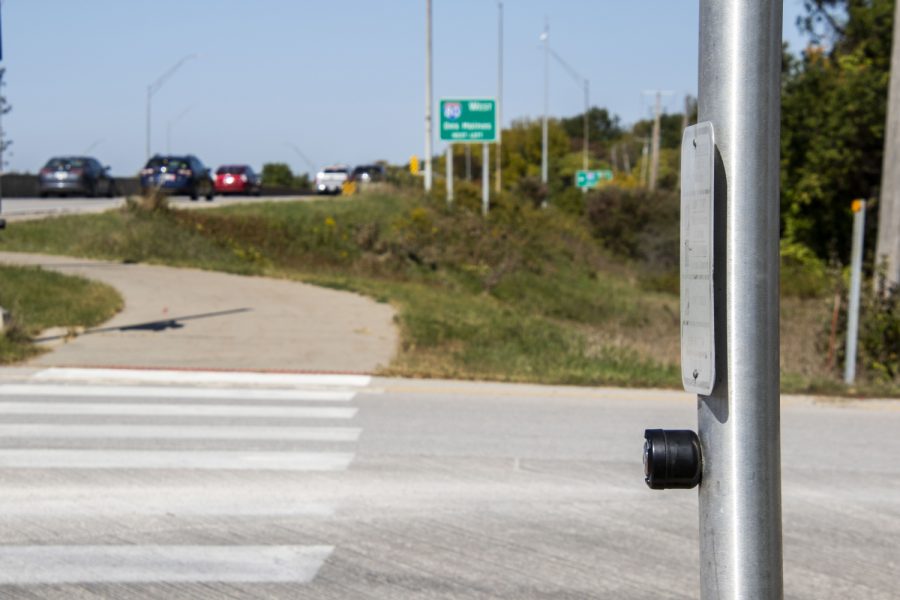Iowa City, Coralville City Councils reject request to implement automated walk signals
Research Dietician at UIHC Dru Mueller requested both councils to implement automated walk signals at high traffic intersections to eliminate risks of spreading COVID-19.
A crosswalk button is seen at the intersection of Dubuque St. and Foster Rd. on Tuesday, Oct.6, 2020.
October 11, 2020
Iowa City and Coralville City Councils have rejected a proposal from a University of Iowa Hospitals and Clinics employee to create automated signals at intersections instead of crosswalk buttons to help eliminate the spread of COVID-19.
Research Dietician at the UI College of Public Health and UIHC Dru Mueller said pedestrians and bicyclists having to physically touch crosswalk buttons at intersections brings about health and safety concerns with COVID-19.
Mueller said she received responses from representatives of both city councils and learned they rejected her request. There is currently no proposal in front of either councils, she said.
Mueller said she is an avid jogger and bicyclist. When she encounters larger intersections with crosswalks that require her to physically press the walk button, such as when crossing I-80 at Dubuque Street and Foster Road, it makes her uncomfortable, she said.
“I think that would make it easier for bicyclists and pedestrians and runners to use the intersections,” Mueller said. “In addition to making it safer and not having to worry about pressing a button when you can’t wash your hands, that it would also just make it easier to cross some of these big intersections that can be scary to cross.”
Mueller said she was in Madison, Wisconsin over the summer and noticed the city has an increased number of automated crosswalks. There were signs up along intersections that are heavily used by bicyclists and pedestrians that tell them not to physically press the crosswalk button — which is something she thought would be beneficial to implement in Iowa City.
RELATED: Hai Huynh elected as newest Coralville city councilor
She said she received several responses telling her that implementing more automated walk signals would potentially cause the flow of traffic to decrease.
“I can understand they have concerns that traffic will be slowed down,” Mueller said. “But I also think that they could think about which intersections might make a big difference, for pedestrians and bicyclists, and consider changing those. They don’t have to change all the intersections.”
Mueller said she is disappointed that the cities are not considering individual intersections in regard to her recommendation.
“I just feel like they’re prioritizing car traffic automatically over pedestrian and bicycle traffic,” Mueller said.
Iowa City Associate Transportation Planner Sarah Walz said that, when Mueller suggested this idea, the transportation department reached out to Madison, Wisconsin to gain more understanding of their recent implementations.
“We reached out to the City of Madison and chatted with them about their policy and what they were doing, just to have some background information with that,” Walz said. “We certainly considered the request, understand it better, but there is no move to go forward with it at this time.”
RELATED: Dustin Liston appointed Iowa City Police Chief unanimously by city council
There are automated pedestrian crosswalks at various intersections in downtown Iowa City, Waltz said, but the council didn’t think it was necessary to implement additional ones.
“We’ve looked at this before,” Walz said. “We don’t think it would be of any great benefit.”
City of Coralville Streets and Solid Waste Superintendent Eric Fisher said he’s received several requests similar to Mueller’s since COVID-19 became a prevalent issue within the community.
Fisher said that, if these automated walk signals were to be implemented at additional intersections, this would cause traffic to stall for 30-60 seconds, regardless of whether pedestrians or bicyclists were waiting to cross at the intersection.
In addition to slowing traffic, Fisher said this would also potentially cause more drivers to run red lights during times where there are no pedestrians waiting to cross.
He said he believes this would cause him to receive more calls from residents and law enforcement that the traffic signals are malfunctioning. Fisher said he understands the concern pedestrians have with touching crosswalk buttons because the concern of contracting COVID-19 from touching surfaces, however, he does not have a perfect solution to this.
“If it’s people that are more concerned, they could have something with them to touch the button, they could use a body part besides the hand,” Fisher said. “I don’t have the ideal solution for it.”






